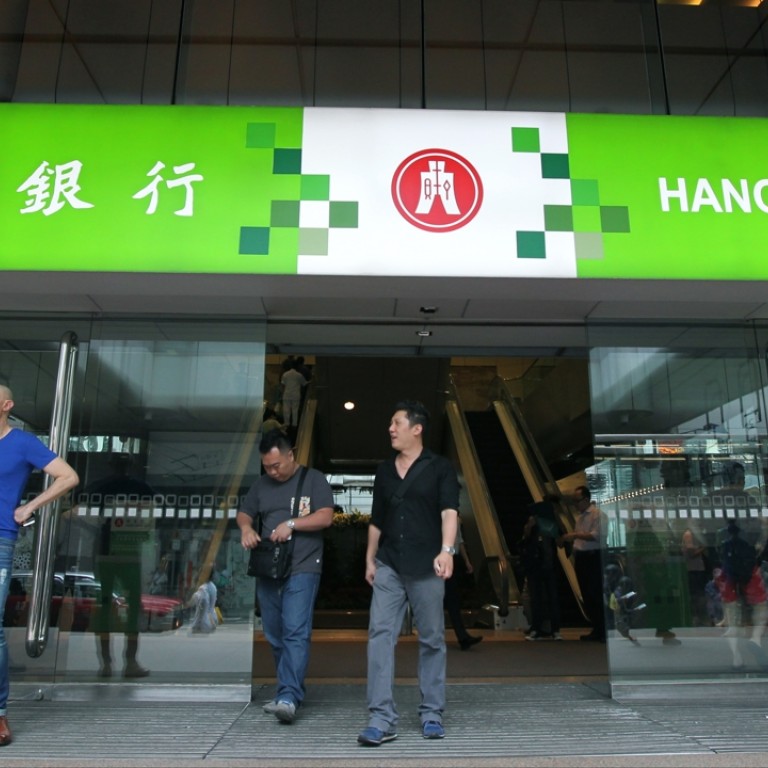
Breaking | Hang Seng Bank net profit up 82 per cent on sale of stake in mainland China lender
HSBC to be biggest winner from high dividend payout
Hang Seng Bank’s chief executive warned on Monday of a challenging operating environment this year as it reported an 82 per cent rise in net profit for last year and paid out a record high dividend to shareholders.
The Hong Kong-headquartered bank said its net profit rose 82 per cent to HK$27.49 billion last year mainly due to one-off gains of HK$10.64 billion from the disposal of its 11 per cent investment in Shanghai-listed Industrial Bank last year. Hang Seng retains a 0.88 per cent stake in the mainland lender.
The result was in line with market expectations ranging from HK$26.30 billion to HK$28.86 billion, and follows a net profit of HK$15.13 billion in 2014. Excluding the one-off gain, profit was up 4 per cent.
The lender will pay a special dividend of HK$3 per share as well as a final dividend of HK$2.40, bringing the full-year dividend to HK$8.70, the lender’s highest on record, following a full-year dividend of HK$5.60 in 2014.
Major shareholder HSBC, which owns 62 per cent of the bank, will be the biggest winner, receiving HK$10.29 billion of the total HK$16.63 billion dividend payout for last year.
Vice-chairman and chief executive Rose Lee Wai-mun said she expected the operating environment this year to be worse than last year.
“The operating environment this year is going to be more challenging than last year,” she said. “Both the Hong Kong and mainland economies have slowed down. This will reduce the demand for loans. Our bank will be more cautious in loan approvals.”
She said the high dividend was due to the gain from the Industrial Bank disposal and the payout represented 60 per cent of all profit, which she described as “a high payout ratio”.
Investors cheered the payout, with Hang Sang Bank shares soaring 6.49 per cent to close at HK$134.50.
The strong result was also due to lower bad-debt provisions last year, down 3 per cent to HK$1.11 billion, with Lee saying mainland China’s bad debt situation had improved in the second half of the year .
“The worst is over for China’s bad debt situation,” she said. “However, we will continue to be cautious and won’t be too aggressive in lending in China.
“The slowdown of the mainland economy has an impact in both Hong Kong and China businesses.”
Lee added that the bank would continue to hire staff for its management trainee programme, compliance department, and other parts of the business.
“We will increase salary and offer compensation to staff based on individual performance,” she said.

Operating profit was HK$20.54 billion last year, little changed from 2014. Net fee income rose 13 per cent to HK$7.03 billion, driven by a 38 per cent increase for the securities broking business and 5 per cent growth of fund sales, but Lee said investment market sentiment had deteriorated in the second half.
Net interest income increased 7 per cent to HK$21.16 billion, driven by growth of consumer lending and customer deposits, but that was partly offset by a narrowing of net interest margin, which was down by 7 basis points to 1.83 per cent from 1.9 per cent in 2014.
At the end of December, the bank’s total capital ratio was 22.1 per cent, compared with 15.7 per cent at the end of 2014. The high dividend payout will reduce its capital ratio by 2 percentage points.
Louis Tse, director of VC Brokerage, said Hang Seng Bank’s results and special dividend payment were both in line with market expectations. But he expected the bank would face headwinds this year.
“Hang Seng Bank has a wide business exposure in mainland China, where it is facing an economic slowdown,” he said. “In addition, the bank is a major mortgage lender and may take a hard hit from the weak local property market. Investors need to be cautious about the bank’s outlook.”

